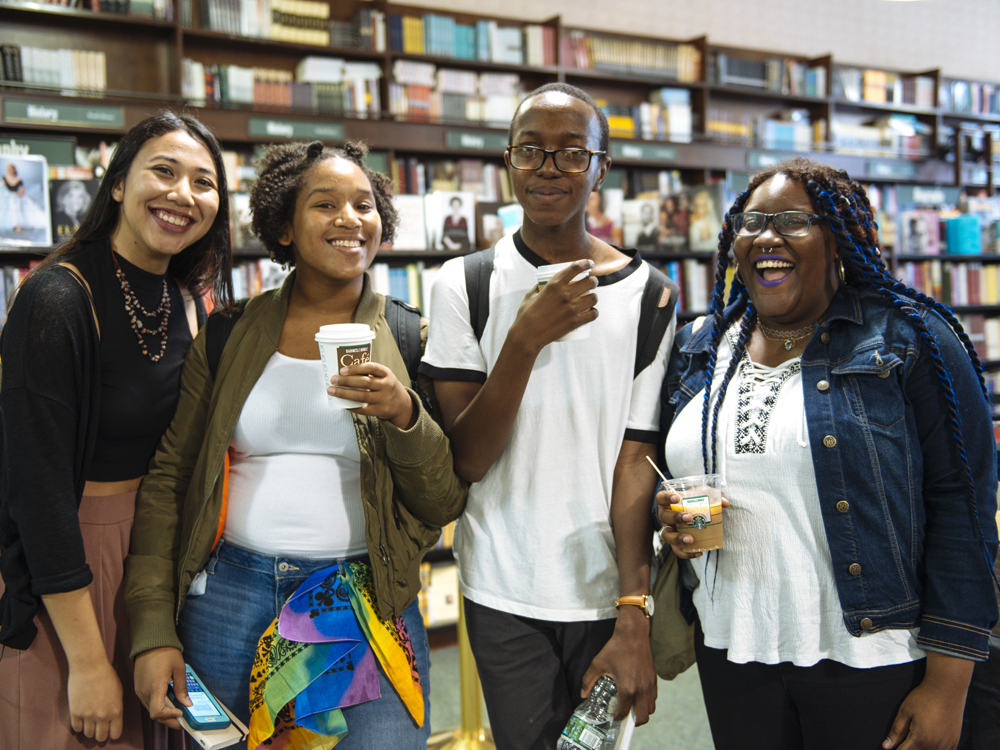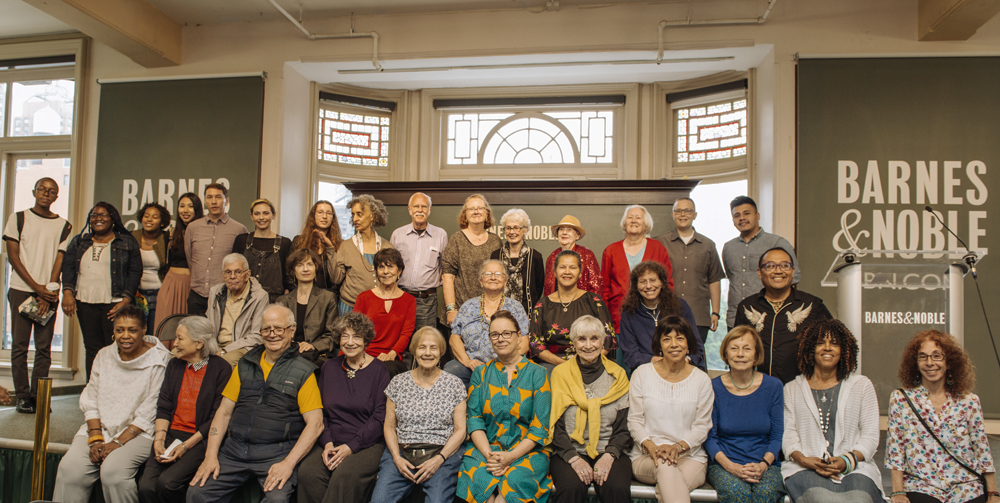Literary Paraphernalia in the New York Public Library, Poetry’s Comeback, and More
Michiko Kakutani’s reading habits; Ottessa Moshfegh’s ten favorite books; Heather Christle’s revision process; and other news.
Jump to navigation Skip to content
Michiko Kakutani’s reading habits; Ottessa Moshfegh’s ten favorite books; Heather Christle’s revision process; and other news.
In an interview published earlier this year by Electric Literature, Sofia Samatar discusses the concept of speculative memoir with authors Matthew Cheney, Carmen Maria Machado, and Rosalind Palermo Stevenson, all who have written work that blends memoir with elements of the highly imaginative that is typically reserved for science fiction, fantasy, and fabulist literature. Machado talks about alternating between real events and genre fiction that act as extended metaphor. Stevenson says, “In some ways introducing the imagined is perhaps a way of daring to approach the material.” Think of a specific memory whose particulars seem blurry or difficult to approach. Write a speculative essay or short memoiristic piece in which you approach this memory by inserting a blatantly fictional aspect or character. How does this element of fiction open up new or alternative possibilities for the way you’ve long recalled this event, situation, or relationship?
Writing poetry next to a particle accelerator; an interview with Paris Review editor Emily Nemens; pizzas delivered with poems; and other news.
“Even if what you’re writing seems boring to you...you’re preparing yourself for the moment when life or something else broadsides you and you need to write.” John Freeman, editor of the essay anthology Tales of Two Americas: Stories of Inequality in a Divided Nation (Penguin Books, 2017), shares writing advice and what his favorite authors have in common.
Study shows films based on books take in more money at the box office; children’s books on refugees; the best-selling books of 2018 so far; and other news.
App Libib helps users catalog their book collections; a response to William Logan’s review of Ocean Vuong; the changing landscape of romance novels; and other news.
Readings & Workshops (East) director Bonnie Rose Marcus writes about Poets & Writers’ Connecting Generations seventeenth annual Intergenerational Reading held at Barnes & Noble at Union Square in New York City.
 On Saturday, June 23, Poets & Writers held its seventeenth annual Intergenerational Reading at Barnes & Noble at Union Square, where we’ve held the reading for the past seven years. As I listened to the thirty-six writers from the ages of eleven to eighty-six, I thought back to the beginnings of this celebratory reading, when we were given a grant in 2001 from the Louis and Anne Abrons Foundation to conduct writing workshops at senior and teen community centers. Visiting the programs, I was moved by the diversity of voices, and the similarities and differences in the generations. I thought it would be inspiring to bring these generations together. The first Intergenerational Reading was held in a community room at the Goddard Riverside Community Center’s NORC Program, with about six readers and an audience of about twenty.
On Saturday, June 23, Poets & Writers held its seventeenth annual Intergenerational Reading at Barnes & Noble at Union Square, where we’ve held the reading for the past seven years. As I listened to the thirty-six writers from the ages of eleven to eighty-six, I thought back to the beginnings of this celebratory reading, when we were given a grant in 2001 from the Louis and Anne Abrons Foundation to conduct writing workshops at senior and teen community centers. Visiting the programs, I was moved by the diversity of voices, and the similarities and differences in the generations. I thought it would be inspiring to bring these generations together. The first Intergenerational Reading was held in a community room at the Goddard Riverside Community Center’s NORC Program, with about six readers and an audience of about twenty.
This year’s writers were from six programs funded by our Readings & Workshops program: senior writers from the Goddard Riverside Community Center, Grand Street Settlement, the Center for Black Literature at Medgar Evers College in collaboration with Siloam Presbyterian Church, Kew Gardens Community Center, and the Stanley Isaacs and Lincoln Square Neighborhood Center. The teen and young adult writers were from Kamit Preparatory Institute, the National Domestic Writers Alliance, Leslie-Lohman Museum of Gay and Lesbian Art, Newtown Literary Alliance, Concourse House, and Office Hours Poetry Workshop.
Hosting our event was veteran host Regie Cabico, a recipient of a Poets & Writers’ Writers for Writers Award in 2006. A pioneer of spoken word, and the first openly queer and Asian slam poet to take top prizes, Regie continues to perform his unique blend of poetry, stand-up comedy, and theater, and teaches writing workshops throughout North America and the United Kingdom.
Regie’s enthusiasm was contagious. It was evident that each reader felt honored and respected, and was cheered on by Regie and the audience, a full house of about seventy-five people. The writers shared work about loss, abuse, and love: a Tibetan woman read a poem about the suffering in her country, another writer shared a prose poem featuring Noah (and his ark) and Donald Trump, and there were many moving pieces about the challenges and celebrations on life’s journey.
Perhaps the best way to sum up the flavor and value of this reading is to hear from some of the writers themselves:
“It is an extraordinary event for so many reasons. It is an opportunity to hear young and old from so many different vantage points. Many of us may never have that chance of hearing stories from the LGBTQ community, the senior community, or inner-city youth, most of whom are passionate, wistful, angry, and gifted. To see that many participants, some who are facing an audience for the first time, pour out their most intimate feelings with pride and receive kudos for their efforts, is a humbling and inspiring experience.”
—Joyce Berger, Kew Gardens Community Center
“This year, I finally shed a lifelong struggle with stage fright and enjoyed myself at the reading! I also relished everyone’s spoken words, especially those of the younger poets who infuse me with creative energy.”
—Suzanne Pavel, Goddard Riverside Community Center
“I have always felt that one never stops learning. Young folks can learn from seniors and vice versa. This year I had the chance to let young folks know about the real situation in Tibet, because they are our future. Afterwards some of the young folks hugged me and commented on the power of my poem. I also think my poem was timely because of the current situation at our southern borders. What struck me most were the young people who spoke so honestly and showed that poetry is an outlet for all of us.”
—Chukie Wangdu, Stanley Isaacs Neighborhood Center
“Young talents lyrically reported their passions from today’s frontlines while older writers arranged those puzzle pieces left on youth’s table. The reading reminded me that poetry is an instrument played to remember, berate, reveal, coax, question, love, revolt, heal, and most significantly, to witness and connect. Thank you for creating space for all of us!”
—Marty Correia, Office Hours Poetry Workshop

Support for the Readings & Workshops Program in New York City is provided, in part, by public funds from the New York State Council on the Arts, and the New York City Department of Cultural Affairs, with additional support from the Frances Abbey Endowment, the Cowles Charitable Trust, and the Friends of Poets & Writers.
Photos: (top) Dena Igusti, Aaliyah Daniels, Solomon Mussings, and Shakeva Griswould from Urban Word NYC (Credit: Christian Rodriguez). (bottom) Participants of the 2018 Intergenerational Reading (Credit: Christian Rodriguez).The best #bookface Instagram shots; things to know before taking a creative writing class; Kevin Powers on his new Civil War novel; and other news.
“I hear words spoken in the mouths of children, threaded in complex narratives.” At a 92nd Street Y event, Valeria Luiselli reads from her book Tell Me How It Ends: An Essay in Forty Questions (Coffee House Press, 2017), which details her experience as an interpreter for undocumented Latin American children facing deportation.
A profile of Anne Tyler; the legacy of Brazilian writer Joaquim Maria Machado de Assis; summer reading for misfits; and other news.